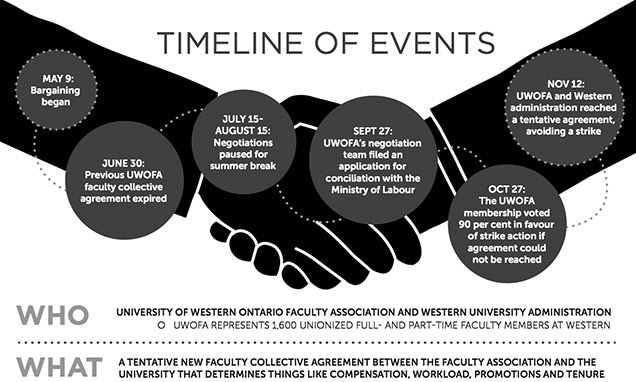UWOFA and Western reach tentative contract agreement
 CREDIT: NAIRA AHMED
CREDIT: NAIRA AHMEDA timeline of events where a deal needed to be ratified by UWOFA members and Western's board of governors.
LONDON — Unlike four years ago, the negotiations for Western’s new faculty contract didn’t go down to the dying minutes of a midnight strike deadline.
The University of Western Ontario Faculty Association and Western’s administration announced that they have reached a new, tentative collective faculty agreement, avoiding a potential strike by Western’s professors.
The negotiations have been underway since last May and began in preparation for the previous collective agreement’s expiry on June 30, 2014. The preliminary deal was reached on Wednesday after five days of mediation with Greg Long, a Ministry of Labour appointed conciliator.
The collective faculty agreement determines things like the compensation, working conditions and pensions of faculty members at Western.
In early November, UWOFA members voted 90 per cent in favour of strike action if negotiations with a conciliator failed to produce a result.
Alison Hearn, president of UWOFA, said Long’s presence moved along the final stretch of the negotiation period.
“The conciliator made a big difference; it’s always good to have a third party in the room, a neutral, objective third party,” Hearn said. “Things really started coming together once he was there.”
The next step in the negotiation process is presenting the tentative contract to UWOFA’s board of directors, followed with a ratification vote by UWOFA’s membership.
Helen Connell, associate vice-president of communications at Western, said Western administration is pleased that a tentative agreement has been reached. Western’s board of governors will review the contract on behalf of the university.
Hearn said she expects the new faculty collective agreement will be finalized within the next few weeks if everything goes smoothly. From there, the contents of the deal will be reviewable by the public.
If the conciliation process had failed, both sides can continue to bargain or either side can ask the conciliator to file a “no board” report declaring they’re at an impasse. After that, a strike is legally possible 17 days after the report is filed.
Matt Helfand, University Students’ Council (USC) president, said the USC is glad the event of strike has been avoided.
“We’re relieved there looks like there will be no labour interruption in this school year,” Helfand said. “It’s not a good outcome for the university, who want to educate students, or the faculty, who wants to teach.
Helfand added students can’t be at the negotiation table but that they should be interested in the outcome because it affects their education.
UWOFA represents over 1,600 unionized full and part-time faculty members at Western. Hearn added she’s proud of UWOFA’s negotiation team and its membership.
“I’m extremely proud of our negotiation team, they worked really hard,” Hearn said. “Every negotiation is a give and take, the tone at the table was always collegial … I think mostly people are feeling really positive about it.”













